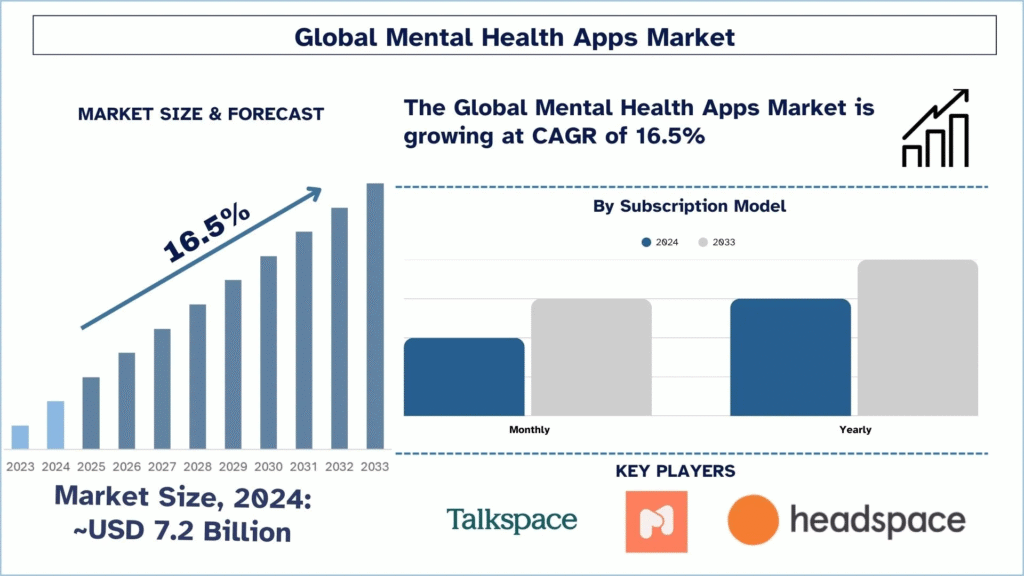
According to UnivDatos, the Mental Health Apps Market was valued at approximately USD 7.2 billion in 2024 and is projected to grow at a CAGR of around 16.5% during 2025–2033. The growth is primarily driven by increasing internet penetration and the widespread adoption of smartphones.
According to the World Health Organization (WHO), around 60–70 million people in India suffer from common and severe mental disorders—an alarming situation. India records over 2.6 lakh suicide cases annually, making it the world’s suicide capital. Globally, anxiety disorders have surged from 298 million to 374 million, marking a 25% increase.
Sustainable Development Goals (SDG) targets 3.4 and 3.5 emphasize reducing the prevalence of mental illness. Mental health disorders significantly diminish life satisfaction compared to other communicable and non-communicable diseases.
Factors Affecting Mental Health
Mental health conditions are influenced by a combination of individual, societal, and systemic factors.
- Individual factors include psychological and biological traits such as emotional intelligence, heredity, and substance use.
- Societal conditions, such as poverty, inequality, and violence, can severely impact mental well-being.
- Systemic risks can occur throughout life, but childhood is the most vulnerable stage. Physical punishment, strict parenting, and bullying are major contributors to mental distress.
- Other influences include interpersonal relationships, quality education, stable employment, safe neighborhoods, and cohesive communities.
Access sample report (including graphs, charts, and figures): https://univdatos.com/reports/mental-health-apps-market?popup=report-enquiry
According to the National Crime Records Bureau (NCRB), over 13,000 suicide deaths (7.6%) in 2022 were linked to mental health struggles. Data from the National Institute of Mental Health and Neurosciences (NIMHANS) reveals that over 80% of Indians lack access to mental healthcare services. The WHO estimates that poor mental health will cost India over USD 1.03 trillion (2012–2030).
Government of India Initiatives
India has undertaken several initiatives to strengthen mental healthcare infrastructure:
- National Mental Health Program (NMHP) was launched in 1982 to minimize the burden of mental disorders.
- Kiran Helpline (1800-599-0019) – Launched in 2020 by the Ministry of Social Justice and Empowerment to assist people facing depression, anxiety, stress, and suicidal thoughts.
- NIMHANS developed the iGOT–Diksha platform to train healthcare professionals in delivering online psychosocial support.
- MANODARPAN Initiative – Introduced by the Ministry of Education in July 2021 to provide psychological support to students, parents, and teachers during the COVID-19 pandemic.
- MANAS (Mental Health and Normalcy Augmentation System) App – Launched in 2021 as part of the PM-STIAC national program to promote mental well-being.
- National Tele Mental Health Programme (2022–23) – Announced in the Union Budget to improve accessibility to quality counselling and care services nationwide.
- Section 309 IPC Amendment – Attempts to commit suicide are now treated with more compassion, penalized only under special circumstances.
Mental Health Promotion
- Low public expenditure on healthcare as a percentage of GDP limits access to affordable mental health services.
- Rural and remote areas face acute shortages of mental healthcare centers, leading to increased out-of-pocket costs and delayed treatment.
- Severe shortage of professionals: India has only 0.3 psychiatrists, 0.12 nurses, 0.07 psychologists, and 0.07 social workers per 100,000 people.
- Youth vulnerability: Over 50% of India’s population is under 25, making them more prone to mental health challenges.
- Human rights concerns: Individuals with mental illnesses often face physical abuse, sexual violence, and unjust confinement, even within their homes.
- Social stigma and isolation are especially prevalent among the elderly, poor, and adolescents.
Click here to view the Report Description & TOC: https://univdatos.com/reports/mental-health-apps-market
Way Ahead
India needs higher budgetary allocation and resource investment to build an empathetic and inclusive mental healthcare system. Establishing self-help groups, community-based initiatives, NGOs, and family support networks can significantly reduce stigma and promote awareness.
Continuous funding and awareness campaigns are crucial to address deep-rooted taboos surrounding mental health. Services must be compassionate, stigma-free, and accessible to all.
Recent Developments
- Bollywood actor Suniel Shetty launched a mental wellness app, “Let’s Get Happi,” in collaboration with Veda Rehabilitation & Wellness, providing 24/7 therapy access.
- The shortage of trained psychiatrists and psychologists and the stigma around mental illness are pushing healthcare providers to recommend mobile apps and tele-consultation.
- Emerging mental health start-ups such as Evolve, Kaha Mind, Wysa, MANAH, Trijog, and Amaha are leveraging technology to develop innovative solutions for mental wellness.
Conclusion
Developing mental health and wellness apps tailored to India’s diverse population is an urgent need. These apps should be integrated with public health programs like the National Health Mission, Poshan Abhiyan, and e-Sanjeevani, and be multilingual to ensure inclusivity.
However, technology alone is not enough. Addressing stigma, increasing the number of professionals, and ensuring strong coordination between NMHP, Ayushman Bharat, and National Adolescent Health Programme are vital.
The post-pandemic world has amplified mental health challenges, making it essential for India to sustain its focus on awareness, accessibility, and compassion in mental healthcare.
Contact Us:
UnivDatos
Contact Number – +1 978 733 0253
Email – contact@univdatos.com
Website – www.univdatos.com
Linkedin- https://www.linkedin.com/company/univ-datos-market-insight/mycompany/

